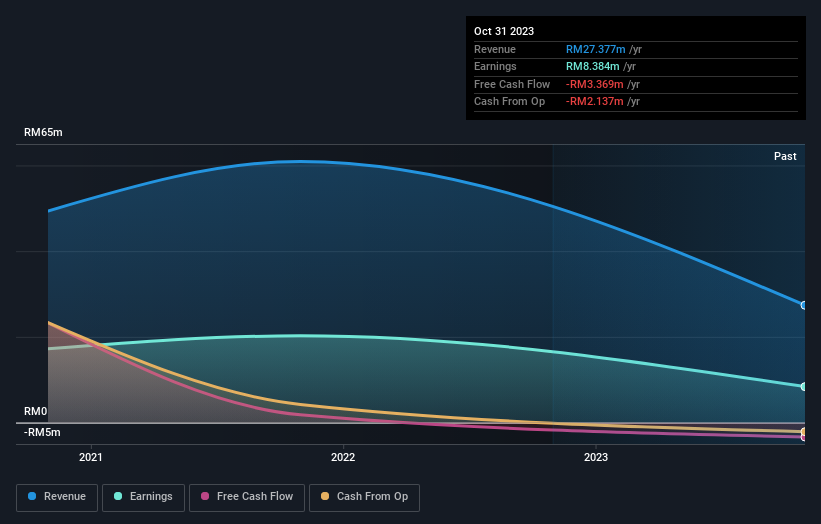- Malaysia
- /
- Capital Markets
- /
- KLSE:MERSEC
Mercury Securities Group Berhad's (KLSE:MERSEC) most bullish insider, CEO Sing Chew must be pleased with the recent 13% gain

Key Insights
- Significant insider control over Mercury Securities Group Berhad implies vested interests in company growth
- A total of 2 investors have a majority stake in the company with 74% ownership
- Using data from company's past performance alongside ownership research, one can better assess the future performance of a company
Every investor in Mercury Securities Group Berhad (KLSE:MERSEC) should be aware of the most powerful shareholder groups. The group holding the most number of shares in the company, around 45% to be precise, is individual insiders. Put another way, the group faces the maximum upside potential (or downside risk).
As a result, insiders were the biggest beneficiaries of last week’s 13% gain.
In the chart below, we zoom in on the different ownership groups of Mercury Securities Group Berhad.
Check out our latest analysis for Mercury Securities Group Berhad

What Does The Lack Of Institutional Ownership Tell Us About Mercury Securities Group Berhad?
Small companies that are not very actively traded often lack institutional investors, but it's less common to see large companies without them.
There are multiple explanations for why institutions don't own a stock. The most common is that the company is too small relative to funds under management, so the institution does not bother to look closely at the company. Alternatively, there might be something about the company that has kept institutional investors away. Mercury Securities Group Berhad might not have the sort of past performance institutions are looking for, or perhaps they simply have not studied the business closely.

We note that hedge funds don't have a meaningful investment in Mercury Securities Group Berhad. The company's CEO Sing Chew is the largest shareholder with 37% of shares outstanding. Enrogetz Sdn Bhd is the second largest shareholder owning 37% of common stock, and A. Bin Safar holds about 8.2% of the company stock. Interestingly, the third-largest shareholder, A. Bin Safar is also a Member of the Board of Directors, again, indicating strong insider ownership amongst the company's top shareholders.
To make our study more interesting, we found that the top 2 shareholders have a majority ownership in the company, meaning that they are powerful enough to influence the decisions of the company.
While it makes sense to study institutional ownership data for a company, it also makes sense to study analyst sentiments to know which way the wind is blowing. Our information suggests that there isn't any analyst coverage of the stock, so it is probably little known.
Insider Ownership Of Mercury Securities Group Berhad
The definition of company insiders can be subjective and does vary between jurisdictions. Our data reflects individual insiders, capturing board members at the very least. Company management run the business, but the CEO will answer to the board, even if he or she is a member of it.
Most consider insider ownership a positive because it can indicate the board is well aligned with other shareholders. However, on some occasions too much power is concentrated within this group.
It seems insiders own a significant proportion of Mercury Securities Group Berhad. It has a market capitalization of just RM563m, and insiders have RM255m worth of shares in their own names. It is great to see insiders so invested in the business. It might be worth checking if those insiders have been buying recently.
General Public Ownership
The general public-- including retail investors -- own 18% stake in the company, and hence can't easily be ignored. While this size of ownership may not be enough to sway a policy decision in their favour, they can still make a collective impact on company policies.
Private Company Ownership
We can see that Private Companies own 37%, of the shares on issue. Private companies may be related parties. Sometimes insiders have an interest in a public company through a holding in a private company, rather than in their own capacity as an individual. While it's hard to draw any broad stroke conclusions, it is worth noting as an area for further research.
Next Steps:
While it is well worth considering the different groups that own a company, there are other factors that are even more important. Take risks for example - Mercury Securities Group Berhad has 1 warning sign we think you should be aware of.
If you would prefer check out another company -- one with potentially superior financials -- then do not miss this free list of interesting companies, backed by strong financial data.
NB: Figures in this article are calculated using data from the last twelve months, which refer to the 12-month period ending on the last date of the month the financial statement is dated. This may not be consistent with full year annual report figures.
New: Manage All Your Stock Portfolios in One Place
We've created the ultimate portfolio companion for stock investors, and it's free.
• Connect an unlimited number of Portfolios and see your total in one currency
• Be alerted to new Warning Signs or Risks via email or mobile
• Track the Fair Value of your stocks
Have feedback on this article? Concerned about the content? Get in touch with us directly. Alternatively, email editorial-team (at) simplywallst.com.
This article by Simply Wall St is general in nature. We provide commentary based on historical data and analyst forecasts only using an unbiased methodology and our articles are not intended to be financial advice. It does not constitute a recommendation to buy or sell any stock, and does not take account of your objectives, or your financial situation. We aim to bring you long-term focused analysis driven by fundamental data. Note that our analysis may not factor in the latest price-sensitive company announcements or qualitative material. Simply Wall St has no position in any stocks mentioned.
About KLSE:MERSEC
Mercury Securities Group Berhad
Provides stockbroking and corporate finance advisory services primarily in Malaysia.
Flawless balance sheet low.


